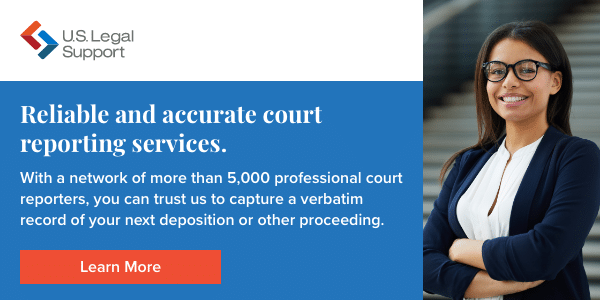How to Prepare for a Deposition: Tips for Preparing Clients

Depositions taken during discovery are the mainstays of your case. Although you often have the least amount of control over what information comes to light during opposing counsels’ depositions, the outcomes are critical to steering a trial strategy and determining whether a case can be negotiated into settlement.
While you can’t pull the strings on what your clients and witnesses say when deposed by opposing counsel, you can send them into depositions with the foreknowledge and confidence to stay on track and do their best under pressure with proper deposition preparation.
Deposition Tips for Clients and Witnesses
Knowing how to prepare a client for a deposition is extremely important, especially if your client or witness is being deposed for the first time. They need to be armed with information on how to prepare for a deposition and avoid common pitfalls.
For client and witness preparation, start by ensuring they understand that depositions are sworn testimony and may be leveraged both directly and indirectly by opposing counsel throughout a lawsuit or trial process. Then, once you’ve prepped them on their specific evidence or testimony, share these tips:
#1: Tell the Truth
At the start of the deposition, the witness is sworn in and asked to promise to tell the truth. While there are many benign reasons you may lie in the course of a normal week (such as to avoid hurt feelings, or in lieu of a lengthy honest response that’s inappropriate or inconvenient at the moment), lying during a deposition has much more serious consequences.
Lying during a deposition can result in:
- A perjury charge
- Limitations on what can ethically be argued moving forward
#2: Demand Clarity
If you don’t fully understand a question, ask for clarification. In fact, you can ask the lawyer to:
- Define an unfamiliar term
- Rephrase the question
- Be more specific
- Not ask leading questions
When you provide an answer to a question, you’re essentially giving the questioner two pieces of information they can legally use:
- Acknowledgment that you fully understood the question
- The specific answer to the question
This means you generally cannot change your deposition testimony later based on a claim that you didn’t understand something when asked in the deposition—so make sure you know what the question means in full before responding.
#3: Review Documents and Evidence Carefully
If you’re asked to identify any documents during questioning, be sure you read through them in full and with care.
Glancing at something that “looks like it’s the right one” and going along with the questioner’s assertion of the document’s contents, meaning, or origin means you’re providing your legal stamp of agreement that yes, this is in fact what the lawyer claims it is.
#4: Take Your Time
Don’t rush your responses. Listen carefully, ask for clarification, and think before answering out loud.
If the questioning lawyer pushes you to respond more quickly or suggests that taking time is a sign of lying, call them out on it by saying something along the lines of: “Please stop pressuring me to answer quickly; I’m making sure I understand each question before answering.”
#5: Answer Concisely
If it’s a yes or no question, limit your answer to one of those two words. Lawyers are delighted when deponents offer up more information than they’re asked, and doing so might give them details to use against you, even if they seem harmless at the moment.
Here are a few other dos and don’ts to keep in mind when answering:
- Don’t guess at information or speculate on possibilities
- Do keep your answers short and to the point
- Don’t volunteer extra information or expand on the facts
Particularly watch out for the pressure to fill in silence. Lawyers may pause or look expectant after you answer a simple question, as witnesses often fall to the social burden to speak instead of waiting out the silence.
#6: Don’t Make Friends
Ideally, your brush with the legal system will be handled with courtesy and ethical behavior by everyone involved, but even in those cases, this isn’t the time or place to make friends.
Casual conversation, small talk, and jokes all contain fragments of information about you that will be evaluated in addition to your on-the-record answers. Additionally, being treated with warm regard can make you more prone to say more than you’d planned during the deposition.
#7: Don’t Answer If…
You may have to respond to questions that you find intrusive, awkward, or even offensive during a deposition. In fact, lawyers can question individuals much more thoroughly during in-person or virtual depositions than in a courtroom where a judge is in place to rule on objections to scope or phrasing.
However, there are a few important exceptions. Deponents can refrain from answering if the question is about:
- Privileged information (i.e., doctor/patient, lawyer/client, priest/confessor)
- Self-incriminating information (a deponent may invoke the 5th Amendment)
#8: Use Caution in Pleading the Fifth
Invoking the 5th Amendment to avoid self-incrimination is one way to avoid answering a question during a deposition, but should be used with caution. If it’s done under oath at a deposition, then you’re stuck with it through trial. If you anticipate anything that could spark the need for 5th Amendment protection during a deposition, be sure to discuss it with your lawyer ahead of time.
#9: Make an Emotional Plan
Even if you don’t expect the deposition to be a high-drama experience, you should prepare for how to manage your emotions throughout the deposition process. Be aware that:
- It’s okay to show emotion, but make sure it doesn’t harm your ability to answer
- You can ask for a break to calm down
- Lawyers may attempt to provoke emotions to break down your defenses
While some emotion is fine (and often appropriate), speaking in anger is almost always a poor decision. If temper is an issue, use whatever tools you can (such as breathing exercises) to calm down before speaking or reacting.
#10: Take Care of Your Body
In most circumstances, federal courts limit depositions to a seven-hour period over one day, and many states have a similar guideline, although the number of hours ranges from three to eight.
If you’re tired, hungry, thirsty, or need a trip to the bathroom, it can compromise your attention, your analytical thinking, and your control over your responses. You can avoid letting any opposing attorney take advantage of these circumstances by:
- Arriving early enough to locate bathrooms and beverage sources
- Bringing healthy snacks to eat during breaks (but don’t eat during the deposition)
- Asking for snack, water, and bathroom breaks when needed
#11: Bring Pre-Approved Documents Only
Unless arranged in advance with your lawyer, the only document you bring should be a current photo ID. If you pull out any notes or a calendar to refer to while answering questions, it opens up the opportunity for opposing counsel to examine them.
Expert witnesses should consult with the legal team that engages them to clarify exactly what reports, notes, drafts, or other materials to bring to the deposition in addition to self-credentials.
#12: Dress for Success
While it can be irritating to be asked to alter your style or self-presentation, appearance does invoke assumptions and color impressions. Just like avoiding casual conversation or volunteering information, you should think of this tactic as limiting the details that opposing counsel could gather about you visually to ensure a successful deposition.
To do this:
- Aim for conservative business casual dress (for instance, dress pants, a shirt, and shoes in neutral colors)
- Minimize the display of tattoos and non-ear piercings
- Avoid unique garments and those with slogans, statements, or images
- Stay away from casual wear (jeans, shorts, sandals)
- Leave hats and flashy jewelry or accessories at home
Start with the Right Court Reporter for a Smooth Deposition
By preparing your client with the 12 tips above, you can help them feel more confident facing their upcoming deposition. And when it comes to scheduling your own depositions, here’s a helpful tip for you: secure the right court reporter for the job.
To access a network of 5,000+ professional and experienced court reporters nationwide, partner with U.S. Legal Support. Since 1996, we’ve provided top-notch, all-inclusive legal support services, including specialized court reporting, litigation consulting, interpreting and translation, realtime deposition transcript services, record retrieval, and more.
Contact us today by phone, email, or website request form to discuss how we can help with your litigation support and upcoming deposition needs.
Sources:
United States Court of International Trade. Rule 30. Depositions by Oral Examination. https://www.cit.uscourts.gov/sites/cit/files/Rule%2030.pdf

Editoral Policy
Content published on the U.S. Legal Support blog is reviewed by professionals in the legal and litigation support services field to help ensure accurate information. The information provided in this blog is for informational purposes only and should not be construed as legal advice for attorneys or clients.



